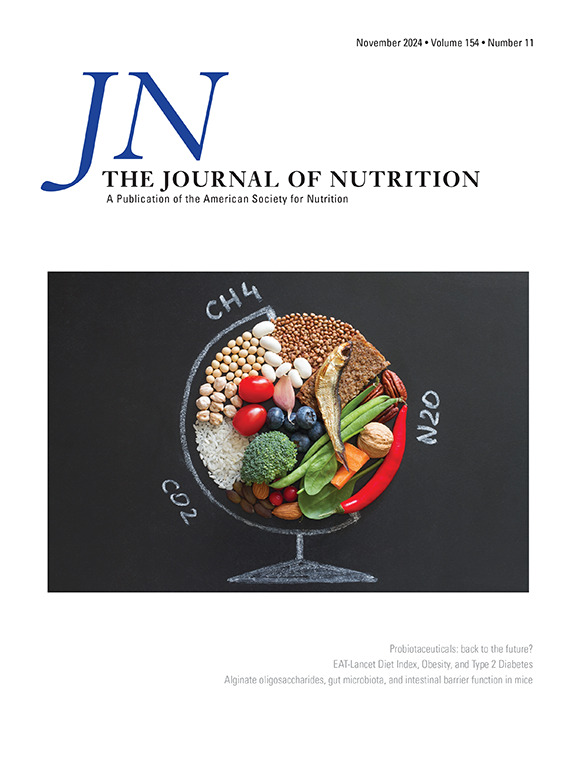膳食胆碱和甲基供体在调节母体炎症中的相互作用:来自活体项目的见解。
IF 3.7
3区 医学
Q2 NUTRITION & DIETETICS
引用次数: 0
摘要
背景:妊娠期炎症是导致孕产妇和子代发病率和死亡率的重要因素。来自未怀孕的人类和动物研究的证据表明,饮食胆碱可以减轻炎症,但尚未在人类怀孕中进行探索。目的:本研究探讨了孕妇妊娠中期饮食胆碱摄入量与炎症生物标志物,特别是白细胞介素-6 (IL-6)、肿瘤坏死因子-α (TNF-α)和c反应蛋白(CRP)之间的横断面关联,同时也研究了其他甲基供体营养素的修饰作用。方法:我们分析了在马萨诸塞州东部的纵向队列研究项目Viva中登记的640名孕妇的数据。我们通过半定量食物频率问卷评估妊娠中期孕妇的饮食摄入量,并测量同时采集的孕妇血液中的炎症标志物,即IL-6、TNF- α和CRP。我们采用审查和线性回归模型来评估z评分胆碱摄入量与对数转化炎症标志物的关联,并评估胆碱摄入量与其他甲基供体营养素摄入量之间的潜在相互作用。我们评估了未经调整的模型和根据社会人口统计学和饮食协变量调整的模型。结果:我们发现胆碱摄入量对IL-6、TNF-α或CRP水平无主要影响(例如,IL-6 β = -0.02 pg/mL 95% CI =(-0.08, 0.05))。然而,一个相互作用项表明,胆碱和其他甲基供体营养素的联合摄入量越大,IL-6就越低(例如,甜菜碱的相互作用=-0.08 pg/mL, 95% CI =(-0.14, -0.02))。我们没有观察到类似的相互作用效应或TNF-α或CRP。结论:这些发现强调了胆碱和其他膳食甲基供体在妊娠期间调节炎症状态中的相互作用,特别是通过IL-6。较高的甲基供体营养摄入可能是胆碱抗炎作用的必要条件,但这方面的进一步研究是有必要的。本文章由计算机程序翻译,如有差异,请以英文原文为准。
The Interplay of Dietary Choline and Methyl Donors in Modulating Maternal Inflammation: Insights from Project Viva
Background
Inflammation during pregnancy is an important contributor to maternal and offspring morbidity and mortality. Evidence from both nonpregnant human and animal studies suggests that dietary choline can attenuate inflammation, but this has not yet been explored in human pregnancy.
Objectives
This study explored the cross-sectional associations between maternal mid-pregnancy dietary choline intake and inflammation biomarkers, specifically IL-6, tumor necrosis factor- α (TNF-α), and C-reactive protein (CRP), while also examining the modifying effects of other methyl donor nutrients.
Methods
We analyzed data from 640 pregnant women enrolled in Project Viva, a longitudinal cohort study in Eastern Massachusetts. We assessed mid-pregnancy maternal dietary intake via a semiquantitative food frequency questionnaire, and measured inflammatory markers in maternal blood collected concurrently, namely IL-6, TNF-α, and CRP. We employed censored and linear regression models to assess associations of z-scored choline intake with log-transformed inflammatory markers and assessed potential interactions between choline intake and intakes of other methyl donor nutrients. We assessed unadjusted models and models adjusted for sociodemographic and dietary covariates.
Results
We found no main effect of choline intake with IL-6, TNF-α, or CRP levels [for example, for IL-6, β = −0.02 pg/mL, 95% confidence interval (CI): −0.08, 0.05]. However, an interaction term demonstrated that greater combined intake of choline and other methyl donor nutrients was related to lower IL-6 (for example, for betaine, β interaction =−0.08 pg/mL, 95% CI: −0.14, −0.02). We did not observe similar interaction effects or TNF-α or CRP.
Conclusions
These findings highlight the interplay between choline and other dietary methyl donors in modulating inflammation status during pregnancy, specifically through IL-6. Higher intake of methyl donor nutrients may be necessary for any anti-inflammatory effects of choline, although further studies in this area are warranted.
求助全文
通过发布文献求助,成功后即可免费获取论文全文。
去求助
来源期刊

Journal of Nutrition
医学-营养学
CiteScore
7.60
自引率
4.80%
发文量
260
审稿时长
39 days
期刊介绍:
The Journal of Nutrition (JN/J Nutr) publishes peer-reviewed original research papers covering all aspects of experimental nutrition in humans and other animal species; special articles such as reviews and biographies of prominent nutrition scientists; and issues, opinions, and commentaries on controversial issues in nutrition. Supplements are frequently published to provide extended discussion of topics of special interest.
 求助内容:
求助内容: 应助结果提醒方式:
应助结果提醒方式:


